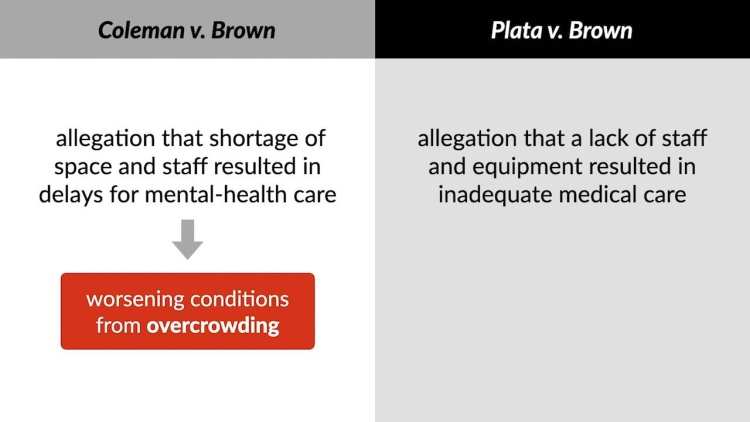Brown v. Plata
United States Supreme Court
131 S. Ct. 1910, 563 U.S. 493 (2011)
- Written by Craig Conway, LLM
Facts
Severe overcrowding of California’s prisons, as well as deficient mental health and medical care and lack of state resources led to the filing of two class actions. The first, Coleman v. Brown, involved prisoners with serious mental disorders. There, a district court found “overwhelming evidence of the systematic failure to deliver necessary care” to inmates. The second case, Brown v. Plata, involved a class of prisoners with serious medical conditions. In that case, the State conceded that deficiencies in prisons violated the Eighth Amendment’s prohibition against cruel and unusual punishments. The court found that the California “prison medical care system is broken beyond repair,” resulting in an “unconscionable degree of suffering and death.” The Coleman and Plata plaintiffs moved their respective district courts to convene a three-judge court empowered under the Prison Litigation Reform Act of 1995 (PRLA) to order reductions in the prison population. After extensive testimony and evidence, the three-judge court ordered California to submit a plan to reduce its prison population to 137.5 percent of the prisons’ design capacity within two years which would result in the release of 38,000 to 46,000 inmates. California appealed. The U.S. Supreme Court granted certiorari to review.
Rule of Law
Issue
Holding and Reasoning (Kennedy, J.)
Dissent (Scalia, J.)
What to do next…
Here's why 907,000 law students have relied on our case briefs:
- Written by law professors and practitioners, not other law students. 47,100 briefs, keyed to 996 casebooks. Top-notch customer support.
- The right amount of information, includes the facts, issues, rule of law, holding and reasoning, and any concurrences and dissents.
- Access in your classes, works on your mobile and tablet. Massive library of related video lessons and high quality multiple-choice questions.
- Easy to use, uniform format for every case brief. Written in plain English, not in legalese. Our briefs summarize and simplify; they don’t just repeat the court’s language.





